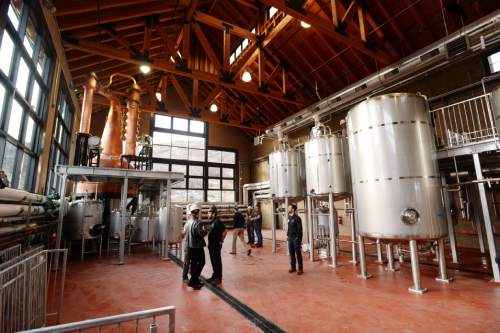This is an archived article that was published on sltrib.com in 2016, and information in the article may be outdated. It is provided only for personal research purposes and may not be reprinted.
Utah lawmakers made three significant changes to state's liquor laws in 2016: distilleries will soon be allowed to offer tastings, hotels may apply for a universal liquor license and businesses applying for special-event alcohol permits will have clear rules to follow.
What lawmakers didn't do was get rid of the Zion Curtain — the 7-foot barrier that new restaurants are required to have in order to shield minors from the sight of alcoholic beverages being poured and mixed. However, lawmakers did say they will study the issue during the upcoming year.
Under the new tasting law, HB228, distilleries will be able offer on-site tastings of their product to customers, something that wineries and breweries already are allowed to do. At the same time, lawmakers tightened restrictions for all alcohol producers, setting a maximum amount of alcohol that can be sampled in a 24-hour period: 5 ounces of wine, 2.5 ounces of liquor and 16 ounces of beer or flavored malt beverages.
Manufacturers also must create separate areas of consumption "outside the view of minors" and they must make "substantial food" available to tasters. The Utah Department of Alcoholic Beverages will determine what constitutes substantial food, but it will not require alcohol producers to add kitchen facilities.
Legislation also will allow hotels to obtain one master liquor license from the state for all operation, instead of separate permits for each restaurant, bar and banquet facility under one roof. The law, SB217, frees up hard-to-obtain licenses including 40 limited-use restaurant licenses, which the state ran out of last month.
Lawmakers also clarified how alcohol permits for special events are granted in HB13. Any business or group that meets all the standards required by the DABC would be approved. Tequirements include strict security to prevent underage drinking and overconsumption of alcohol and a three-year history of no violations.
A bill, HB350, that would have created a secret shopper program at state-owned liquor stores did not pass.



